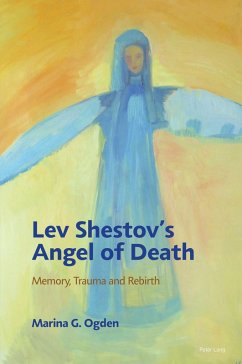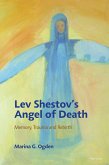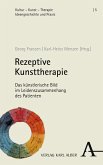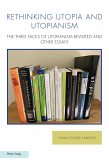«Marina G. Ogden offers a competitive and comprehensive look at the prominent Russian thinker Lev Shestov. This valuable book, based on archival sources, provides good historical background for Shestov's investigations, which is very important for a better understanding not only Russian religious thought but also Western philosophy of the twentieth century.» (Professor Teresa Obolevitch, The Pontifical University of John Paul II, Krakow)
«The pioneering Russian existentialist Lev Shestov influenced Camus, Bataille, Celan and many others. In this absorbing study, Marina G. Ogden shows how his «parable» of the many-eyed Angel of Death anticipates much recent thinking about trauma and its effects in setting a life on a unique and sometimes creative path.»
(David M. Black, the author of Why Things Matter: The Place of Values in Science, Psychoanalysis and Religion)
«Marina G. Ogden's Lev Shestov's Angel of Death is a unique and invaluable contribution not only to the scholarship on Shestov but also to a concern that is continues to occupy anyone who has wrestled with the problematic relation between life and meaning, between death and meaninglessness. Her important book is at once deeply informed, profoundly wise, and urgently needful.» (David Patterson, Review in Studies in East European Thought, March 2022)
At the beginning of the twentieth century the Russian émigré philosopher Lev Shestov (1866-1938) challenged traditional philosophical norms and brought the individual experience of the anxiety of death to the forefront of philosophical investigation. Based on new research and translations of Shestov's unpublished manuscripts, notes and correspondence, this book analyses the thoughts of one of the most influential thinkers of the past century in an interdisciplinary context. While uncovering the roots of the philosopher's existential position, the author traces Shestov's «wandering through souls» of the world's most significant philosophers and writers within the context of a historical and biographical narrative, offering a close reading of his thinking in its chronological progression. A new interpretation of Shestov's philosophy, this comparative and hermeneutical analysis focuses on the thinker's continual search for meaning on the question of human mortality. Bringing together up-to-date research findings in Russian, English and French, an evolutionary analysis of the key notions in Shestov's philosophy - the problems of truth, revelation, faith and death - is carried out in conjunction with the ideas of such pivotal figures in Western culture as Fyodor Dostoevsky, William James, Edmund Husserl, Karl Jaspers, Martin Buber and Sigmund Freud.
«The pioneering Russian existentialist Lev Shestov influenced Camus, Bataille, Celan and many others. In this absorbing study, Marina G. Ogden shows how his «parable» of the many-eyed Angel of Death anticipates much recent thinking about trauma and its effects in setting a life on a unique and sometimes creative path.»
(David M. Black, the author of Why Things Matter: The Place of Values in Science, Psychoanalysis and Religion)
«Marina G. Ogden's Lev Shestov's Angel of Death is a unique and invaluable contribution not only to the scholarship on Shestov but also to a concern that is continues to occupy anyone who has wrestled with the problematic relation between life and meaning, between death and meaninglessness. Her important book is at once deeply informed, profoundly wise, and urgently needful.» (David Patterson, Review in Studies in East European Thought, March 2022)
At the beginning of the twentieth century the Russian émigré philosopher Lev Shestov (1866-1938) challenged traditional philosophical norms and brought the individual experience of the anxiety of death to the forefront of philosophical investigation. Based on new research and translations of Shestov's unpublished manuscripts, notes and correspondence, this book analyses the thoughts of one of the most influential thinkers of the past century in an interdisciplinary context. While uncovering the roots of the philosopher's existential position, the author traces Shestov's «wandering through souls» of the world's most significant philosophers and writers within the context of a historical and biographical narrative, offering a close reading of his thinking in its chronological progression. A new interpretation of Shestov's philosophy, this comparative and hermeneutical analysis focuses on the thinker's continual search for meaning on the question of human mortality. Bringing together up-to-date research findings in Russian, English and French, an evolutionary analysis of the key notions in Shestov's philosophy - the problems of truth, revelation, faith and death - is carried out in conjunction with the ideas of such pivotal figures in Western culture as Fyodor Dostoevsky, William James, Edmund Husserl, Karl Jaspers, Martin Buber and Sigmund Freud.
Dieser Download kann aus rechtlichen Gründen nur mit Rechnungsadresse in A, D ausgeliefert werden.
«Marina G. Ogden offers a competitive and comprehensive look at the prominent Russian thinker Lev Shestov. This valuable book, based on archival sources, provides good historical background for Shestov's investigations, which is very important for a better understanding not only Russian religious thought but also Western philosophy of the twentieth century.» (Professor Teresa Obolevitch, The Pontifical University of John Paul II, Krakow)
«The pioneering Russian existentialist Lev Shestov influenced Camus, Bataille, Celan and many others. In this absorbing study, Marina G. Ogden shows how his «parable» of the many-eyed Angel of Death anticipates much recent thinking about trauma and its effects in setting a life on a unique and sometimes creative path.» (David M. Black, the author of Why Things Matter: The Place of Values in Science, Psychoanalysis and Religion)
«Marina G. Ogden's Lev Shestov's Angel of Death is a unique and invaluable contribution not only to the scholarship on Shestov but also to a concern that is continues to occupy anyone who has wrestled with the problematic relation between life and meaning, between death and meaninglessness. Her important book is at once deeply informed, profoundly wise, and urgently needful.» (David Patterson, Review in Studies in East European Thought, March 2022)
«The pioneering Russian existentialist Lev Shestov influenced Camus, Bataille, Celan and many others. In this absorbing study, Marina G. Ogden shows how his «parable» of the many-eyed Angel of Death anticipates much recent thinking about trauma and its effects in setting a life on a unique and sometimes creative path.» (David M. Black, the author of Why Things Matter: The Place of Values in Science, Psychoanalysis and Religion)
«Marina G. Ogden's Lev Shestov's Angel of Death is a unique and invaluable contribution not only to the scholarship on Shestov but also to a concern that is continues to occupy anyone who has wrestled with the problematic relation between life and meaning, between death and meaninglessness. Her important book is at once deeply informed, profoundly wise, and urgently needful.» (David Patterson, Review in Studies in East European Thought, March 2022)









